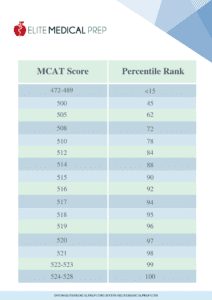MCAT Score: How is the MCAT Scored?

12398 Views
The Medical College Admission Test, aka the MCAT, is the standardized test required to apply to all U.S. and many Canadian medical schools. The MCAT scoring of this multiple-choice test consisting of four sections, spanning critical reading to chemistry, can often mystify those new to the med school application process.
As the MCAT score is a large part of the AAMC medical school application, it is important to understand how the test is designed and scored prior to taking the exam and applying to medical school.
In this blog post, we will:
- walk through the MCAT scoring system
- Discuss where the MCAT score range of 472 – 528 comes from
- Discuss what an average MCAT score is
- Determine what MCAT score you might need to be successful in your medical school applications.
Breaking Down the MCAT Score Algorithm
Is the MCAT curved? Contrary to popular belief, the MCAT is not graded on a curve based on student performances. According to the AAMC, the MCAT exam is scaled and equated such that scores have the same meaning, regardless of when you took the exam in any given testing year.
In short, a score of 515 one day is equivalent to a 515 the next day, regardless of how test-takers did overall on the respective days. This is slightly different from curving.
For example, if your biology class has a really hard midterm, your professor may curve the exam such that the average is a passing score or may curve such that the highest scoring individual on the exam gets a score of 100%. This type of curving is common but is not translatable outside the specific cohort that took a specific exam on that test date.
Since the MCAT is given tens of thousands of times per year across numerous locations, they cannot curve based on individual cohorts. This is a good thing! This means no matter what time of the year you take the MCAT, or how many exceptionally smart people seem to be taking the exam alongside you on test day, your score on a certain day will be the same as if you took the exam alongside, say, a cohort of cute, cuddly puppies.
Bottom line: your MCAT score is only reflective of you and how you did on the sections compared to large swaths of historical data of how students did across many exam forms. So, no need for silent competition between you and the other test takers on test day – imagine yourself in a room of adorable test-taking puppies (or another cute animal of your choice).
Section Scoring Process
The four sections of the MCAT are Biological and Biochemical Foundations of Living Systems, Chemical and Physical Foundations of Biological Systems, Psychological, Social, and Biological Foundations of Behavior, and Critical Analysis and Reasoning Skills (CARS). The Chemistry, Biology, and Psychology/Sociology sections of the MCAT each consist of 59 questions in 95-minute sections. The CARS section is 90-minutes in length and consists of 53 questions.
Correct answers in each section convert into scaled scores ranging from 118 to 132. Although the exact method for determining each scaled score is somewhat of a black box, the AAMC explains that this process called “equating” adjusts for differences in difficulty between question sets. While the proprietary method remains confidential, your scaled score essentially depends on how many questions you answer correctly.
People often wonder what the number of questions correct for an MCAT score is. The following example illustrates how many correct answers you need to score well on the MCAT:
- The AAMC gives an example of getting between 35 and 37 questions right on a section equating to a scaled score of 123, but this is subject to change based on the difficulty of the exam. The raw scores are different from the scaled scores.
- Since the MCAT does not penalize wrong answers, students should answer every question. The highest MCAT score one can get is a 528, which equates to a student getting a scaled score of 132 on each of the four sections.
- Because the final MCAT score equally weighs each section, you should prioritize all topics equally during your study sessions. If you’re not equally strong across all sections at first, that is totally normal. When you start studying for the MCAT, plan to give yourself extra time for your weaker subjects. Check out some of our other blog posts for tips on how to make a comprehensive MCAT study schedule and some ideas for study resources to use. You can also use our pre-made 3-month or 1-month MCAT study plans.
Percentile Ranks: What They Mean, and How They Change From Year to Year
Each MCAT score has an associated percentile from 1 to 100, recent percentile ranks valid between May 1st, 2021 and April 30th, 2022 per the AAMC are seen in the table below. A better score corresponds to a higher percentile, which admissions committees and medical schools use as an important reference point.
For example, if you score in the 90th percentile, that means on average you did better than 90% of other MCAT test takers! Each year, test administrators adjust the percentiles based on average student performance over the past three years of exam data. These long-term changes don’t typically impact students, but it is useful to know where the percentiles come from when you get your score.
What Is a Good MCAT Score for Your Medical School Applications?
What makes a good MCAT score is highly dependent on the goals of each individual applicant. Factors such as applying MD vs DO and the strength of the rest of your AAMC application is integral in determining how high of an MCAT score you might need.
According to the AAMC, the average MCAT score for matriculants to U.S. MD schools in the 2021-2022 application cycle was 511.9, and the average GPA was 3.74. Being in the ballpark of a 510 is often a good starting goal for students who want to apply to MD schools but are unsure of which medical schools they want to apply to.
For a small fee, you can get access to the AAMC’s Medical School Admission’s Requirements (MSAR) database or the ChooseDo database to find the scores ranges for successful medical school admits at many different schools. These databases can help you get a better idea of what range of MCAT score you might need to be a competitive applicant at certain schools.
Keep in mind that your MCAT score isn’t everything, a great MCAT score in the presence of a weak overall application doesn’t make you a shoo-in for medical school. Over the course of your undergraduate education, it is important to bolster your application for medical school with things like research, volunteering, and shadowing, in addition to prioritizing getting a good score on the MCAT.
When Will I Get My Score?
Most MCAT scores come back in 30 – 35 days after taking the exam. Waiting for your score to come back can be stressful. Many students choose to use the time between taking their MCAT and getting their score back to relax and reward themselves for accomplishing a big step towards their AAMC applications.
If you’re the type of person for whom taking a step back and relaxing would be more anxiety-provoking, use the time to start narrowing down the list of schools you are applying to and work on your personal statement. Another loose end that may be good to tie up at this time is figuring out who will write your letters of recommendation for your medical school application and reaching out to them.
Can You Retake the MCAT?
Yes, you can retake the MCAT. However, know that a strong MCAT score your first time around is 1) more pleasant for you, you don’t have to study and take a huge exam twice, and 2) in general, looks better for your medical school applications. If you recently received your score and feel unhappy with it or are considering a retake, check out my other blog post, “5 Reasons You Got a Low MCAT Score”, for guidance on retaking the MCAT after a low score.
Overall, understanding how they score the MCAT and which score to aim for to get into your preferred medical schools helps you prepare before you begin studying for this important exam. Rest assured that whenever you take the MCAT, your score will be reflective of your overall performance and not the performance of the cohort that took that specific test form due to the AAMC’s scaled score algorithm.
Looking for a way to boost the effectiveness of your MCAT prep? Take advantage of MCAT tutoring from Elite Medical Prep!
Happy Studying!
Featured Articles


